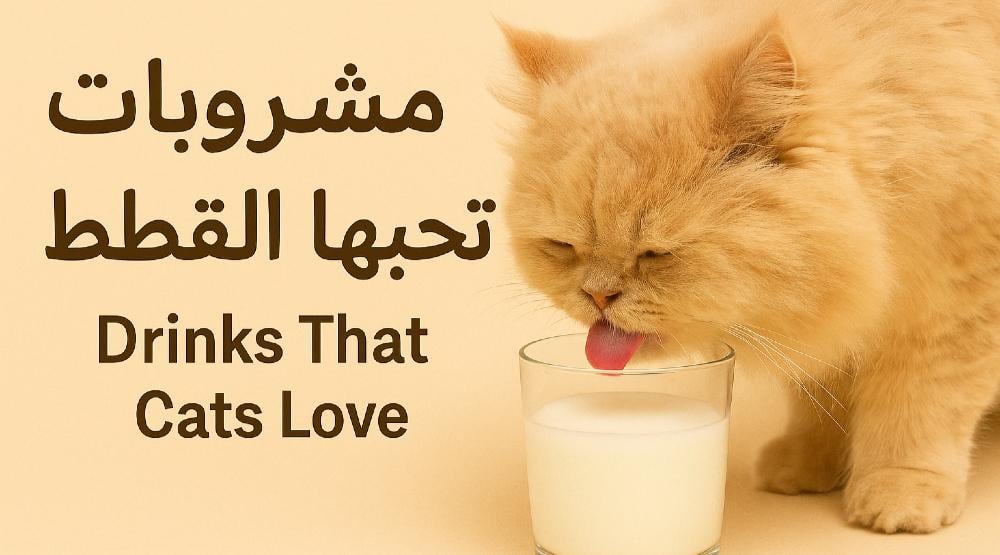Many Saudi families who keep cats strive to meet all their pets’ daily needs—food, hygiene, and healthcare. Yet one aspect sometimes overlooked is the question of which liquids and beverages can be offered safely. Cat owners often ask, “What drinks do cats like?” and “Are there safe alternatives to plain water?” In this article, we review the most suitable beverages for cats, how to serve them properly, and the potential benefits and risks of each type, to ensure your pet’s health and well‑being.
What Are the Best Beverages for Cats?
Fluids are an essential part of daily cat care, but many owners aren’t aware that there are drinks, aside from water, that can be given safely. When we talk about “drinks cats like,” we don’t mean fruit juices or human beverages, but rather carefully selected alternatives that provide extra hydration or nutritional benefits. Below are the top safe and appealing beverages for cats:
Fresh, Clean Water
- Water is the most important and fundamental beverage for cats.
- It should be changed daily, kept in a clean bowl, and placed where the cat can easily reach it.
- While there are other drinks cats may enjoy, water remains the first choice to support kidney function and regulate body temperature.
Unsalted Chicken or Beef Broth
- Boil chicken or beef in plain water without adding spices or salt, then let it cool before offering.
- This flavorful broth is particularly appealing to cats with reduced appetite and can encourage them to eat or drink.
- Try our own chicken broth at the Trappy Bites store.
Salt‑Free Tuna Water
- The water from canned tuna packed in water (not oil or added ingredients) can be offered in small amounts to vary your cat’s fluids.
- Make sure the tuna is packed only in water, without oil or other additives.
- Use it as an occasional treat or to boost fluid intake—not as a daily staple.
Cat‑Specific Milk
- Unlike cow’s milk, which may cause digestive upset, specially formulated “cat milk” sold at pet stores is lactose‑free and gentle on the stomach.
- Offer only small quantities occasionally as a treat.
Choosing safe beverages promotes your cat’s health and prevents dehydration, especially in hot weather. Always consult your veterinarian before adding any new drink to your cat’s diet.
The Importance of Fluids for Cats
Although water is the primary source of hydration, a measured variety of “drinks cats like” can support nutrition and boost overall activity. Key roles of fluids include:
Supporting Kidney Function
- Cats’ kidneys need consistent hydration to filter toxins. Inadequate fluid intake can lead to buildup of waste, urinary tract infections, or kidney stones. Offering appealing drinks alongside water helps increase daily fluid consumption, especially in cats that drink little on their own.
Preventing Dehydration
- Dehydration is common in cats, particularly during hot weather or with a dry‑food diet. Signs include lethargy, dry mouth, or loss of appetite. Providing a range of fluids is an effective preventive measure.
Improving Appetite and Digestion
- Broths (chicken or tuna water) can stimulate appetite in cats who are reluctant to eat. These fluids also facilitate gentle bowel movements, combining nutrition and palatability.
Boosting Energy and Activity
- Cats with adequate hydration tend to be more active and display livelier behavior than those who are under‑hydrated. Serving enjoyable drinks in moderation contributes to better mood and daily engagement.
Beverages to Avoid
Even though certain drinks are safe, others pose serious health risks and must be completely avoided:
Cow’s Milk
- Many assume it’s beneficial, but most cats lack the enzyme to digest lactose, leading to diarrhea or vomiting. Despite some cats enjoying the taste, it’s not a safe choice.
Fruit Juices (Natural or Commercial)
- Juices—even 100% fruit juice—contain sugars and acids that cats’ digestive systems cannot handle. Some ingredients may be toxic even in small amounts.
Caffeinated Beverages
- Coffee, tea, and sodas contain caffeine, which is toxic to cats. Even small amounts can cause rapid heartbeat, muscle tremors, or neurological issues.
Flavored or Carbonated Waters
- Any beverage with artificial flavorings, additives, or carbonation should be avoided. Cats need pure, natural fluids to maintain balance without unwanted substances.
Offering “drinks cats like” should never compromise their health; always choose options that combine appeal with safety.
Trappy Bites’ Favorite Broths for Your Cat
Trappy Bites Natural Beef Bone Broth for Cats & Dogs
Our beef bone broth is more than a dietary addition—it’s comprehensive nutritional support. Slowly simmered from natural beef bones to extract proteins and minerals, it’s enriched with:
- Turmeric to combat inflammation and support liver and joint health
- Black Pepper to enhance turmeric absorption and stimulate appetite
- Apple Cider Vinegar to balance pH and improve nutrient uptake
Benefits:
- Supports physical performance and boosts natural energy
- Contains easily absorbed proteins and rare minerals
Trappy Bites Duck Broth for Cats & Dogs
Looking to support your pet’s digestive health? Our duck broth is the perfect choice for animals sensitive to common proteins. Made from slow‑cooked natural duck bones, it includes turmeric and black pepper to enhance nutrient absorption, plus apple cider vinegar for digestive balance.
Features:
- Rich source of healthy fats and essential minerals
- Gently supports digestion and soothes sensitive stomachs
- Versatile: serve as a light soup or mix into kibble to encourage eating
Caring for your cat’s nutrition isn’t just about solid food—it also means knowing which fluids are beneficial and safe. Proper hydration is key to daily health, and offering “drinks cats like” can help prevent dehydration in cats that may not drink enough water on their own. Always choose carefully and avoid harmful options like cow’s milk or sugary drinks. Favor safe choices like plain water, unsalted broths, and cat‑specific milk to maintain a balanced, health‑supporting regimen.
Frequently Asked Questions
What is a cat’s favorite drink?
Pure, fresh water is every cat’s go‑to hydration source. Occasional treats—such as unsalted chicken or beef broth and lactose‑free cat milk—can be offered to stimulate drinking, especially in cats with low water intake.
What should a kitten drink?
In its first weeks, a kitten relies on its mother’s milk. If that’s unavailable, use specially formulated kitten milk replacer. After one month of age, kittens can begin sampling small amounts of fresh water, mild chicken broth, or cat‑specific milk, but never cow’s milk or other inappropriate beverages.

